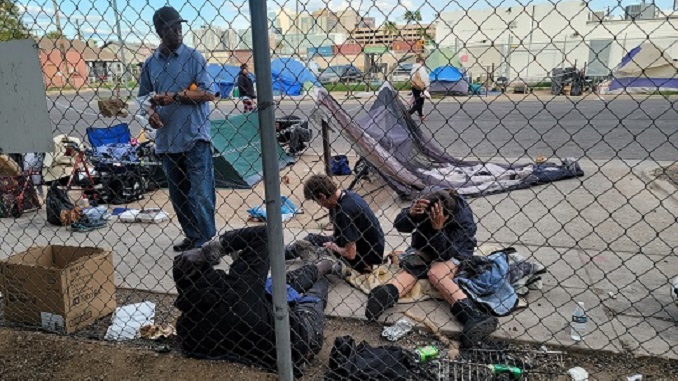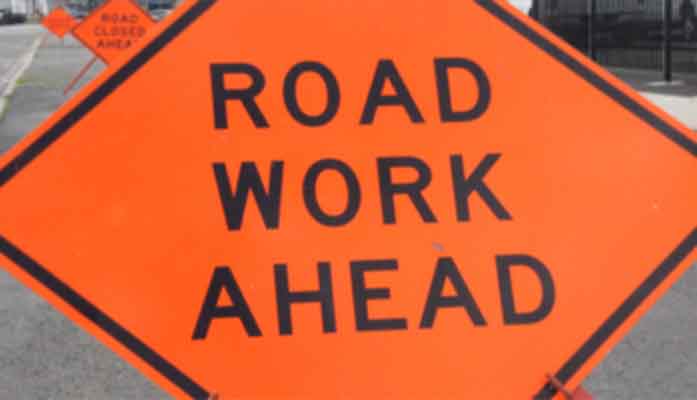
by Daniel Stefanski | Mar 23, 2024 | News
By Daniel Stefanski |
A bill to address Arizona’s homelessness crisis is advancing through the state legislature.
On Monday, the Arizona House of Representatives passed HB 2782, which would “establish a new Homeless Shelter and Services Fund, create new criminal violations involving drugs in homeless service zones, [and] transfer $5,500,000 from the FY 2024 Housing Trust Fund deposit and $50,000,000 from the Consumer Remediation Subaccount” – according to the overview provided by the chamber.
The bill, which was sponsored by State Representative Matthew Gress, was approved along party lines, with a vote of 31-28 (with one member not voting).
Gress, a Republican, wrote, “Arizona’s homelessness crisis is among the worst in the country. Between 2013-2023, total homelessness has skyrocketed nearly 300%. Our voters want us to take decisive action, and it doesn’t involve building our way out of this challenge. We must fund adequate treatment for addiction and mental health, establish greater accountability for our providers and individuals living in the streets, and allow law enforcement to do their job and arrest people who break the law. HB 2782 advances all of these priorities.”
The second-year lawmaker encouraged bipartisan cooperation on his proposal, stating, “I thank my Arizona House Republican colleagues for their support in passing this legislation and welcome House and Senate Democrats to take another look at this bill.”
The Cicero Institute responded to the positive action from the Arizona House on the bill, posting, “Thanks to the leadership of Matthew Gress, HB 2782 passed the Arizona house today. This legislation will do immense good in helping reduce homelessness and getting individuals the assistance they need for substance abuse and mental health challenges.”
The legislation received a green light from the House Committee on Appropriations last month with a 9-7 partisan vote. One member was absent.
When HB 2782 was being considered in committee, the Arizona House Democrats Caucus’ “X” account attacked the bill, writing, “Rep. Matt Gress’s NIMBY bill to make homelessness in Arizona worse in now up in Appropriations. HB 2782 criminalizes homelessness and ties the hands of cities using successful solutions like providing hotel rooms for families transitioning from the streets.”
In that committee hearing, Democrat State Representative Judy Schwiebert blasted Gress’ efforts, saying, “I’m really disappointed to see this grandstanding by the sponsor. It doesn’t provide real solutions.”
Republican State Representatives Selina Bliss, Lupe Diaz, David Livingston, and Julie Willoughby joined as co-sponsors on the bill.
On the Arizona Legislature’s Request to Speak system, representatives from QuikTrip and Cicero Action support the bill. Representatives from Living United for Change in Arizona, Native American Connections, Arizona Coalition to End Sexual and Domestic Violence, Chicanos Por La Causa Inc., American Civil Liberties Union of Arizona, Arizona Public Health Association, Phoenix Community Alliance, The Arizona Center for Economic Progress, Arizona Housing Coalition, National Association of Social Workers – Arizona Chamber, Planned Parenthood Advocates of Arizona, League of Arizona Cities & Towns, and Vitalyst Health Foundation opposed the legislation.
HB 2782 now heads to the Arizona Senate for consideration.
Daniel Stefanski is a reporter for AZ Free News. You can send him news tips using this link.

by Daniel Stefanski | Mar 18, 2024 | News
By Daniel Stefanski |
Arizona Republicans and Democrats are warring over an amended bill in the state legislature that would serve to protect businesses against overreaching government bureaucrats.
On Friday, State Representative Matt Gress sent a letter to Governor Katie Hobbs over her “recent press release voicing opposition to [his] Floor amendment to H.B. 2209.” The bill, which was sponsored by Representative David Livingston, would “add certain responsibilities to the Industrial Commission of Arizona (ICA) relating to violations and inspections [and] continue the ICA for three years.”
The proposal passed out of the Arizona House Committee on Commerce with a 10-0 vote before meeting resistance from the chamber’s Democrats after an amendment from Gress. The Republican lawmaker’s amendment did the following:
- Includes a requirement for the determinations, penalties, and fines for labor violations to be considered, authorized, and determined by an affirmative vote of two-thirds of commissioners present and voting.
- Instructs the commissioners to consider whether a violation continues after the employer’s course of conduct has ceased.
- Prohibits the Director from allowing any individual to accompany an inspector when conducting inspections for the ICA unless the individual meets specified criteria as outlined.
House Democrats attacked the amendment, insinuating that it would “make Arizona workplaces a far more dangerous place to be.” The Caucus’ “X” account posted that Gress’ “meddling could result in federal OSHA taking over Arizona’s state workplace oversight responsibilities.”
The amended legislation narrowly passed the chamber with a 31-28 vote (with one seat vacant).
Gress’s amendment earned a response from the Area Director of the Occupational Safety and Health Administration, T. Zachary Barnett, who wrote to the ICA Director, saying, “the impact of House Bill 2209 on the State Plan’s enforcement program would result in the Arizona State Plan not being ALAE [“as least as effective] with respect to who is permitted to participate in an Arizona Division of Occupational Safety and Health (ADOSH) inspection.” Barnett requested “that these changes be omitted from Arizona’s legislation to avoid OSHA reaching an adverse ALAE determination with respect to the Arizona State Plan.”
In his letter to Hobbs, Gress pushed back on OSHA’s assertions, stating that the letter from the federal bureaucrat “does not provide any legitimate reason for opposing H.B. 2209.” Gress said that the amended bill “will prevent potential safety and financial liability from union organizers, outside agitators, and other third parties who may enter Arizona workplaces with accompanying state OSHA inspectors.” He added, “H.B. 2209 maintains the rights of workers to decide for themselves about union representation, protects Arizona businesses from excessive costs and injury claims and infringement upon their property rights, and promotes safety during worksite inspections.”
Gress then made eight arguments to support his amendment against the claims of OSHA and other detractors. Those were that “H.B. 2209 is consistent with 40 years of interpretation of federal law and seeks only to mitigate the harm from a union-backed expansion of OSHA practices proposed by the Biden Administration,” that “Mr. Barnett’s criticism of H.B. 2209’s definition of ‘authorized employee representative’ is baseless because H.B. 2209 mirrors federal law,” that “H.B. 2209 would enable businesses to protect their trade secrets if outsiders are allowed to accompany Arizona OSHA inspectors,” that “H.B. 2209 would enable businesses to preserve safety during inspections that include outsiders in the workplace,” that “H.B. 2209 will reduce abuses from unions, outsiders, and third parties using OSHA as a tactic in ‘corporate campaigns’ to punish businesses whose workers choose not to be represented by a union,” that “Mr. Barnett’s letter neglects to mention the process entailed for federal recognition of Arizona’s State OSHA plan,” that “it is inappropriate for Mr. Barnett to comment on the amendments to ARS 23-108.03 and ARS 23-408(M),” and that “Mr. Barnett’s letter is simply the latest attempt of OSHA’s repeated pattern of bureaucratic rivalry with the Arizona State OSHA plan.”
Gress ended his letter to the governor by urging her “not to be distracted, deterred, or intimidated by the unfounded opinions expressed in Mr. Barnett’s letter,” but “instead [to] stand with Arizona businesses in support of H.B. 2209 and encourage all legislators to vote in favor of H.B. 2209.”
H.B. 2209 now resides in the Arizona Senate for consideration.
Daniel Stefanski is a reporter for AZ Free News. You can send him news tips using this link.

by Daniel Stefanski | Feb 8, 2024 | News
By Daniel Stefanski |
As Arizona’s homeless problems continue to grow, one Arizona legislator has introduced legislation to deal with some issues the state faces.
This week, State Representative Matt Gress unveiled HB 2782, the Arizona Homeless Protection and Drug Control Act. This bill would “bring significant amendments to existing laws to reduce homelessness and drug-related crime within designated homeless service zones.”
“This legislation is an important step towards reducing chronic homelessness and drug-related crime, ensuring that Arizona’s vulnerable populations are effectively supported while ensuring public safety,” said Representative Gress. “Establishing accountability within homeless service zones will help safeguard our communities from drug-related crime and offer a more structured and supportive environment for our homeless population to rebuild their lives.”
The freshman lawmaker added, “We are taking decisive action to improve the quality of life in these zones, ensuring that they are safe and conducive to rehabilitation and support services. Our goal is to help people and address the root causes of homelessness, which ultimately leads to safer, healthier communities across Arizona.”
According to the press release issued by the Arizona House of Representatives Republican Caucus, the legislation would “introduce new sections under Title 13, Chapter 34, to focus on the unlawful presence and activities related to dangerous drugs in homeless service zones.” Additionally, the bill would “revise existing sections under Title 41 to establish a permanent Homeless Shelter and Services Fund to allow money to be used for temporary emergency shelter while also providing clear guidelines for mixed hoteling in homeless service facilities.”
In the 2023 Annual Homelessness Assessment Report (AHAR) to Congress, which was published in December 2023, there was an estimate of 14,237 people in Arizona who were experiencing homelessness. Arizona had one of the highest rates in the nation of unsheltered people who were experiencing homelessness (7,615, 53.5%). The Grand Canyon State also observed one of the highest increases in individuals who were experiencing homelessness during the COVID-19 pandemic between the years of 2020 – 2022 (29.3%).
Daniel Stefanski is a reporter for AZ Free News. You can send him news tips using this link.

by Daniel Stefanski | Oct 29, 2023 | News
By Daniel Stefanski |
Two Arizona officials have taken steps to look out for their constituents ahead of the Fall Classic.
On Wednesday, both Arizona Attorney General Kris Mayes and State Representative Matthew Gress sent out communications about the upcoming World Series. Mayes took time to “warn consumers to be vigilant against World Series scams.” In a statement, Mayes said, “As Arizonans cheer on the Diamondbacks as they head to the World Series, remember to safeguard yourself against curveballs that scam artists may throw your way. Whether you’re purchasing tickets or looking for a place to stay, always remember to step up to the plate with caution. Your vigilance is the best defense against falling victim to fraudsters.”
Gress sent a letter to Governor Katie Hobbs, asking the state’s chief executive “to issue an executive order extending the time for businesses to sell alcohol during the World Series. He said, “Arizona is a state of champions, and the Diamondbacks’ journey to the World Series exemplifies that spirit. By extending service hours, we’re giving fans an extra hour to celebrate and support our local businesses. Let’s come together, have fun, and show the world why Arizona is the place to be.”
The first-term lawmaker based his request to Hobbs on A.R.S. § 4-244(15)(b), “which allows the governor to issue an executive order extending alcohol sales hours for professional or collegiate national sporting events.” He also highlighted the necessity of working with law enforcement officials to implement this request, saying, “We can strike a balance between celebration and responsibility. With input from our dedicated public safety community, we can make this World Series a memorable and safe event for everyone involved.”
In Attorney General Mayes’ consumer protection alert, she gave the following tips to consumers who are looking to purchase tickets or lodging arrangements for the World Series:
Purchasing Tickets
- Buy tickets only from trusted vendors.
- Be wary of purchasing tickets from someone you don’t know on Craigslist, eBay, or other similar person-to-person marketplace or auction sites.
- Do not pay for tickets with cash, wire transfer, gift cards or pre-paid money transfer. Scam artists often request payment methods that are difficult to trace or recover. If the tickets turn out to be fake, it is highly unlikely you will get your money back. If you pay by credit card and the tickets turn out to be fake, you can dispute the charge.
- If you plan on using a mobile wallet or peer-to-peer payment service, be sure you understand the protections the service provides before making a transaction.
- Be wary of advertisements with low prices. Remember, if it sounds too good to be true, it probably is.
Lodging
- When booking online, be cautious about making reservations with unknown people or businesses. Make sure you receive a written confirmation of your reservation. Legitimate businesses will provide a written confirmation of your reservation.
- Avoid rental companies or individuals listing rental properties who can’t be reached by phone during normal business hours, who tell you that they are out of state or out of country, or who request communication via text only.
- Remember, scam artists often request payment methods that are difficult to trace or recover. If you pay by credit card and there is a problem, you generally have greater protections than other forms of payment.
The World Series between the Arizona Diamondbacks and the Texas Rangers started Friday night. The D-backs are the away team and will host games on Monday, Tuesday, and Wednesday.
Daniel Stefanski is a reporter for AZ Free News. You can send him news tips using this link.

by Daniel Stefanski | Oct 23, 2023 | News
By Daniel Stefanksi |
A freshman legislator is continuing to work toward transportation improvements for an Arizona freeway.
This week, Arizona State Representative Matt Gress sent a letter to the Maricopa Association of Governments (MAG), addressing the extension of Proposition 400 and the necessity of using those allotted dollars for SR 51. He highlights the “crucial” need for Arizona’s freeways to “be among the best in the country” due to “Maricopa County being the fastest growing county in the country and Phoenix and Scottsdale among the fastest growing cities.”
In his letter, Gress notes that “SR 51 has become one of the busiest routes in the state highway system” and that “the pavement between the I-10 ministack and Shea Boulevard is well past its expected life.” According to the letter, the area of freeway described by the legislator “was installed back in 2004 making (that) pavement one of the oldest in the county.”
Representative Gress writes, “In July the Legislature approved legislation to enable Maricopa County to call an election for the extension of Proposition 400 which includes $600 million for the capital rehabilitation of the region’s freeway pavement,” adding that “these funds must be used to ensure our freeways are kept in the best conditions for the people that use them every day to go to work, transport goods, and recreate in our state.”
The lawmaker expressed his hope that MAG expediently takes care of these issues, stating, “I want to ensure your commitment to utilizing these funds to rehabilitate SR 51 in the first phase of MAG’s plan consistent with Proposition 400 monies if approved by the voters.”
Arizona legislators and the state’s governor reached an agreement on Prop 400 at the end of their marathon session in July. After the passage of the proposal out of his chamber, Senate President Warren Petersen said, “The guardrails, taxpayer protections and funding allocations in the text of this bill reflect the priorities of voters, to reinvest their tax dollars in the transportation modes they use most.” Governor Hobbs added, “Today, bipartisan leaders invested in the future of Arizona families, businesses, and communities.”
Daniel Stefanski is a reporter for AZ Free News. You can send him news tips using this link.





